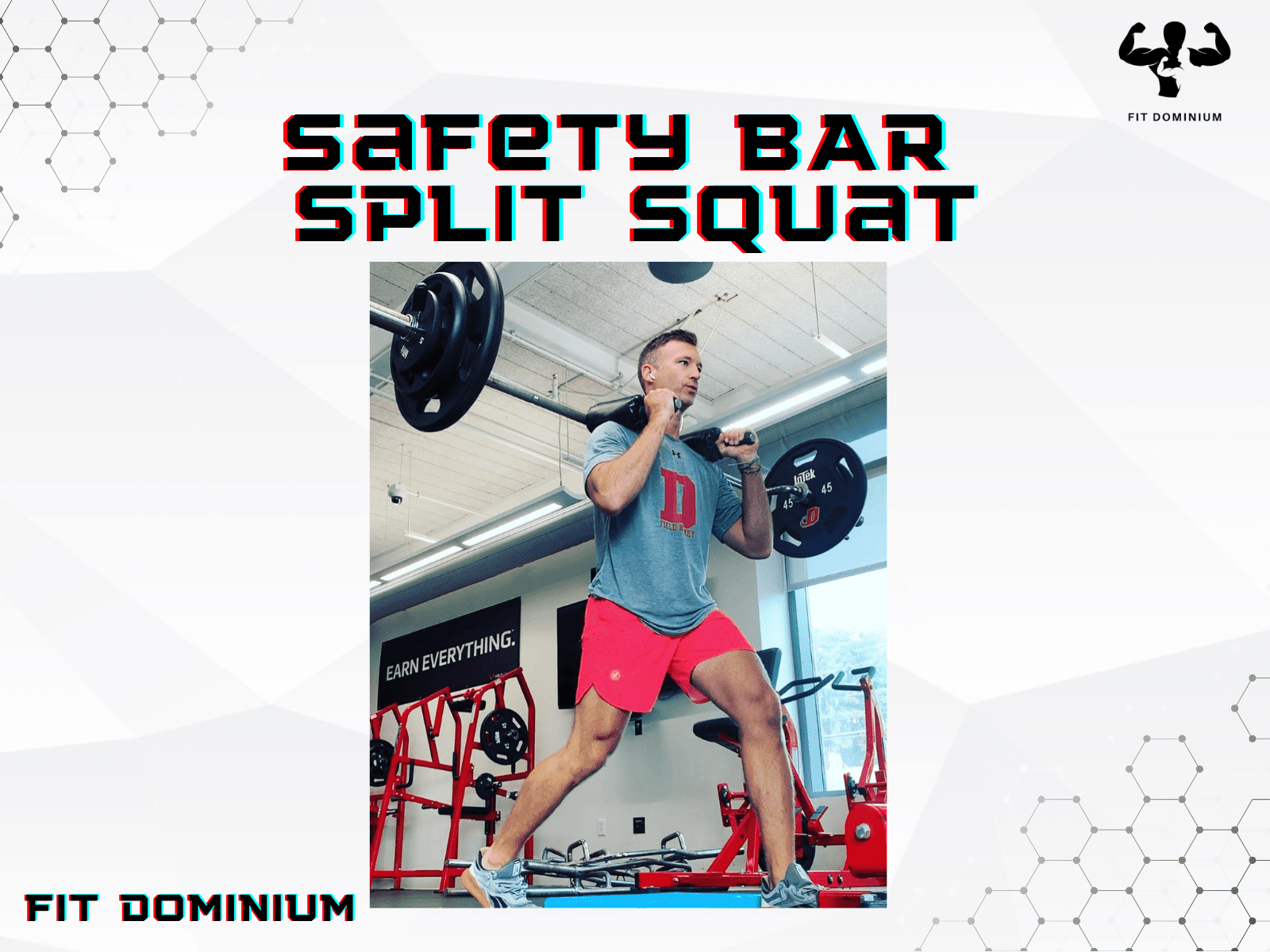
Unilateral leg training can do a lot for hypertrophy, correcting muscular imbalances, and building strength. The problem, though, is that it can be hard to set up and execute. The solution to practical unilateral training is the safety bar split squat. Thanks to the unique design and balance of the safety bar, you can perform one-legged movements without having to worry as much about technique and balance.
In this guide, we will break down the benefits, forms, and variations of the SSB split squat.
Table of contents
The Problem With The Traditional Split Squat
The split squat and other unilateral exercises are frequently cited as key exercises for increasing leg hypertrophy and strength. When done with proper form, this can be true.
The trouble is that very few people can push themselves hard during this movement while maintaining proper form. The need to hold the barbell on their back and then somehow move their foot back just complicates the movement beyond repair for most people. Things only get worse when you start doing more complicated variations like the Bulgarian split squat.
Even with dumbbells that are more adjustable and easy to use, stability issues are still present.
In short, the main problem with this form of unilateral leg training is that the focus is taken away from the legs and instead placed on setting up the movement and maintaining proper form.
The Solution: Safety Bar Split Squats
As it turns out, the safety squat bar can be the solution for many of the previously mentioned problems. Due to the design of the bar, there is no need to lean forward as the bar is already in line with your body. Since you can stay more upright, you don’t have to worry about losing your balance as much as you would with a regular barbell split squat.

This means that if you were to just perform a split squat as you would with a barbell, you would find a drastic reduction in the balance and strain required to set up. But since the bar is stable and balanced on your back, you can even add further stability by grabbing onto handles or another barbell for added stability.
The benefit of course with this is that you can focus even more on leg work. Not to mention, you could even provide assistance with your arms to even push past failure.
SSB Split Squat Variations
Here are a few ways you could do SSB split squats:
Conventional
Video Guide
How To Do SSB Split Squat
Unrack the bar and take a few steps back
Move your rear leg backward
Squat down and stop when the knee of your rear leg is just above the ground
Use your front leg to explode upwards by pushing as hard as you can into the ground
These will still require some level of balance since you are doing them with no support. However, you will worry less about keeping the bar on your back and feel more stable thanks to having the handles in front of you.
Hand-Supported Split Squat
Video Guide
How To Do Hand-Supported Split Squat
Unrack the bar but stay close to the rack
Grab onto the rack or barbell
Move your rear foot back
Squat down while still holding onto the supports until your knee is just above the ground
Explode up by using your front leg. Use the supports if needed.
For this variation, the benefit is that you can go very heavy and past failure. Obviously, the specialty handles are ideal, but you can get away with just using a barbell.
Safety Squat Bar Bulgarian Split Squat
Video Guide
How To Do SSB Bulgarian Split Squat
Place a bench or platform a few steps behind you
Unrack the bar and take a step back
You can do these with your hand assistance or not. If you choose to use your hands, grab onto handles or a bar.
Place your foot onto the bench or platform
Slowly squat down
Explode up by pushing as hard as you can through your front leg
Sometimes referred to as the foot elevated split squat, Bulgarians are very challenging variations of the split squat. Since your rear foot will be elevated, you can actually get a deeper range of motion on your quad.
Importance Of Back Leg Positioning

It is important that you position your front foot and back leg correctly. As a general rule, when you squat down, your back thigh and calf should be forming a 90-degree angle. This is to ensure that you are targeting the right muscle groups.

Of course, this does not apply to the Bulgarian split squat. In that case, you should instead focus on your spine and thigh forming a straight diagonal line.
Benefits Of Single-Leg Exercises
Single-leg training is extremely beneficial. Our problem and concern are simply that most people cannot do it properly. Thankfully, SSB split squats make some of these key single-leg training benefits more accessible:
Correct Muscular Imbalances
Most people have muscular imbalances. This is not really your fault since when you do major compound movements, your stronger side tends to take over a do slightly more than the other. Or if you are coming back from an injury, the injured leg will obviously need some direct work to catch up. To address this weakness, both for aesthetic and strength purposes, the solution is single-leg training.
By doing one leg at a time, you can finally see how your leg strength compares and correct it as necessary.

Build Mind Muscle Connection
The thing about most leg exercises like the squat or deadlift is that they require really heavy weights once you get strong enough. Now strength increases do lead to muscle growth but it is easy just focus on getting the weight up instead of really focusing on and feeling your quads, hamstrings, etc.
Thanks to the lighter loads and less overall strain on your body, you can better focus on executing the movement with precision and really working the muscle that you are targeting.
Bottom Line
Single-leg training is a great way to isolate your legs and correct weaknesses. However, the main limitation is that most single-leg exercises require high levels of mobility and are just really annoying to set up.
The safety bar split squat provides an easy solution. With the balance of the bar, you can worry less about technique and just worry about working your legs hard.

Find The Best Safety Squat Bar
After years of testing, we assembled a master list of the best safety squat bars for every home gym owner
FAQs
Should I squat with a safety bar?
Yes, the SSB is a great special bar that has some great benefits. The mains are that it is easier to stay upright and you can often get a deeper range of motion.
Michael Kirkland, is a trusted fitness expert and founder of FitDominium. With his extensive experience and commitment to helping others, Michael is the go-to source for reliable fitness advice and recommendations.
